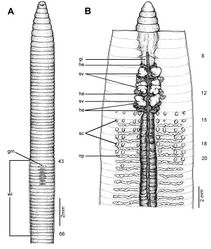Glyphidrilus stuhlmanni
| Notice: | This page is derived from the original publication listed below, whose author(s) should always be credited. Further contributors may edit and improve the content of this page and, consequently, need to be credited as well (see page history). Any assessment of factual correctness requires a careful review of the original article as well as of subsequent contributions.
If you are uncertain whether your planned contribution is correct or not, we suggest that you use the associated discussion page instead of editing the page directly. This page should be cited as follows (rationale):
Citation formats to copy and paste
BibTeX: @article{Chanabun2013ZooKeys265, RIS/ Endnote: TY - JOUR Wikipedia/ Citizendium: <ref name="Chanabun2013ZooKeys265">{{Citation See also the citation download page at the journal. |
Ordo: Oligochaeta
Familia: Almidae
Genus: Glyphidrilus
Name
Glyphidrilus stuhlmanni Michaelsen, 1897 – Wikispecies link – Pensoft Profile
- Glyphidrilus stuhlmanni Michaelsen, 1897: 62. Type locality: Dunda on the Kingani, Tanzania. Michaelsen 1900[1]: 461, 1918[2]: 346. Jamieson 1968[3]: 393. Brinkhurst and Jamieson 1971[4]: 765, fig. 15.4G – H. Zicsi 1996[5]: 20.
Material examined
The specimen which closely matches the measurements and anatomical characters of the original description is designated herein as the lectotype ZMH V4512 (Fig. 7). The type locality of this species is Dunda on the Kingani, Tanzania. Paralectotype: ZMH V4512.1 (only one tail) from the type locality. Additional reference specimens: 1 subadult (ZMH OI13904) from Tanzania, Turiani River Diwale, sugar factory. 3 adults (ZMH OI13902) from Tanzania, Morogoro floodplain. 1 adult (ZMH OI13903) from Tanzania, Turiani floodplain, sugar factory. 1 adult (ZMH OI13937) from Tanzania, Morogoro, sugar factory surrounding area.
Lectotype designation proposed herewith is necessary to ensure the species is based on a complete adult earthworm.
Description of Lectotype
Dimensions: body length190 mm. Body cylindrical in anterior part, quadrangular in transverse section-behind clitellum. 540 segments. Anus dorso-terminal. Body colour pale brown. At posterior end dorsal surface considerably broader than the ventral. Clitellar wi on ventro-lateral part of clitellum in 43–65. Prostomium zygolobous. Dorsal pores absent. Clitellum annular in 30–68. Four pairs of setae per segment from 2, setal formula aa:ab:bc:cd:dd =1.0:0.5:1.5:0.5:1.0 in segment 8. Female pores, male pores and spermathecal pores not visible. Median unpaired gm on aa in 44–50.
Septa 5/6–7/8 thicker, 8/9–11/12 thick and 12/13 to the last segment thin. Gi small, globular within 8. Intestine enlarged from 14. Dorsal blood vessel anterior to 8. He in 8–13. Np distinguishable from segment 15 onwards. Sv in 9–12, those of segment 12 are larger than the others. Ov in 13–14. Testis in 10–11. Prostate and accessory glands absent. Sc in 13/14–20/21, one to four on each side per segment.
Variation
Additional specimens (5 complete adults) have the clitellum in 22, 23, 30–60, 66, 67, 68. Wi in 42, 43–65, 66, 67; gm laterally paired or asymmetrical on bc in 16 or 18–23, 24, 25, 26 or 27, and median unpaired or single on aa in 44/45–50/51, 64/65–67/68; sc sessile, subspherical in 9/10, 10/11, 12/13, 13/14–18/19, 20/21, 21/22.
Remarks
See Table 1.
This species occurs on at least three rivers in Tanzania, the Kigani near Dunda, the Turiani near Diwale, and the Morogoro.
Taxon Treatment
- Chanabun, R; Sutcharit, C; Tongkerd, P; Panha, S; 2013: The semi-aquatic freshwater earthworms of the genus Glyphidrilus Horst, 1889 from Thailand (Oligochaeta, Almidae) with re-descriptions of several species ZooKeys, 265: 1-76. doi
Other References
- ↑ Michaelsen W (1900) Oligochaeta. Das Tierreich 10: 1-575.
- ↑ Michaelsen W (1918) Die Lumbriciden, mit besonderer Berücksichtigung der bisher als Familie Glossoscolecidae zusammenfassten Unterfamilien. Zoologische Jahrbücher, Abteilung für Systematik 41: 1-398.
- ↑ Jamieson B (1968) Journal of Natural History 2: 387-395. doi: 10.1080/00222936800770381
- ↑ Brinkhurst R, Jamieson B (1971) Aquatic Oligochaeta of the World. Oliver and Boyd, Edinburgh, 753 pp.
- ↑ Zicsi A (1996) Neue und bekannte Regenwürmer (Oligochaeta) aus Ost-Afrika. Mitteilungen aus dem Hamburgischen Zoologischen Museum und Institut 93: 17-37.
Images
|
